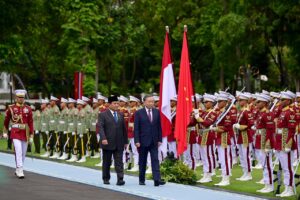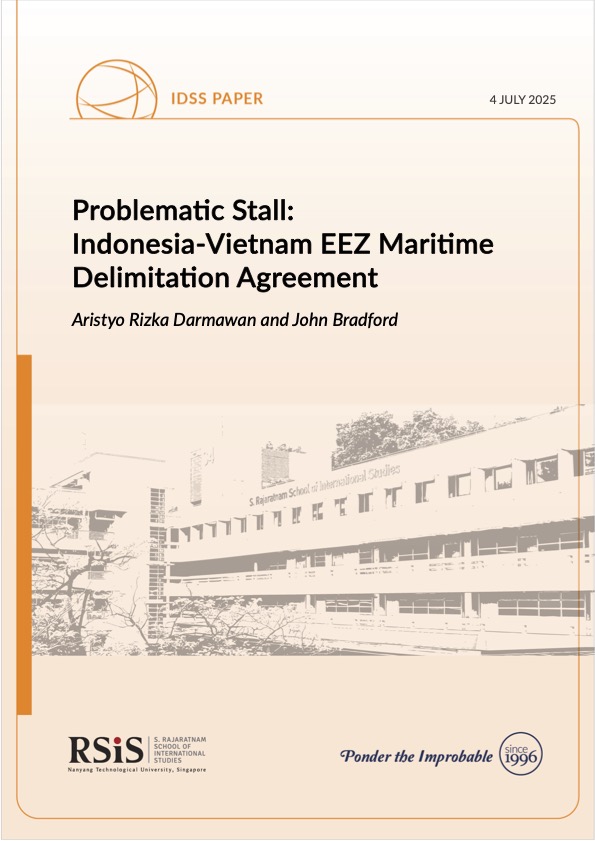04 July 2025
- RSIS
- Publication
- RSIS Publications
- IP25070 | Problematic Stall: Indonesia-Vietnam EEZ Maritime Delimitation Agreement
SYNOPSIS
The 2023 Indonesia-Vietnam Exclusive Economic Zone Agreement can play a valuable role in managing the two countries’ bilateral relationship, elevating their diplomatic standing and improving governance in the South China Sea. However, ratification by the Indonesian parliament has stalled.
COMMENTARY
It has been more than a year since Indonesia and Vietnam concluded an Exclusive Economic Zone (EEZ) agreement, yet the cartographic details of that deal remain unavailable to the public, and there has seemingly been little progress towards ratification of the agreement by the Indonesian parliament. When the agreement was signed in late 2023, scholars generally heralded it as a positive development, not only for Indonesia and Vietnam’s relationship but also for regional peace and security. It is unusual for an Indonesian treaty ratification process to extend beyond a single parliamentary session, and a failure to ratify the agreement will be undesirable.
The agreement came after more than 12 years of maritime delimitation negotiations between Indonesia and Vietnam. During these long negotiations, there were instances when fishers from both countries fished in the undelimited maritime area, which often led to tension and escalation between law enforcement institutions. Physical clashes involving national forces were also documented, including on video. The new agreement should prevent such escalations from reoccurring, as both sides will respect a clear maritime boundary.
While the details of the agreement are unavailable to the public and it has not been formally brought into force, it is already having a positive effect in reducing the risks associated with Indonesia-Vietnam clashes. The two nations’ coast guards and navies appear to be respecting the agreement, based on the patrol routes of their vessels and statements from their representatives. Furthermore, maritime domain awareness analysis conducted by the Indonesian Ocean Justice Initiative shows that Vietnamese fishing boats that previously delved well into the Indonesian-claimed North Natuna Sea area now rarely cross the line marking the northern edge of Indonesia’s continental shelf. It seems that while the public may not know the cartographic details of the arrangement, Vietnamese fishers do, and they are under orders to respect them. Ratifying the agreement will cement the hard-earned and very positive arrangement with Vietnam. Without ratification, Vietnam may perceive Indonesia as not fully upholding its commitments, which could risk losing the progress made. How the Vietnamese will respond to a non-ratification scenario remains to be seen.
Ratifying the deal with Vietnam would also demonstrate Indonesia’s readiness to take hard stances in defence of its sovereign interests while simultaneously finding room to compromise in support of the greater good. It will enhance its diplomatic credibility and strengthen its leadership concerning important maritime affairs such as the ongoing negotiations towards the South China Sea Code of Conduct.
During the meeting between President Prabowo Subianto and Communist Party of Vietnam Secretary General To Lam in March 2025, the former reiterated Indonesia’s commitment to ratifying the EEZ delimitation agreement. In late April, the Indonesian parliamentary commission overseeing the agreement held hearings with experts, who positively described the value of the agreement as an opportunity to resolve issues with Vietnam and strengthen the Indonesian position in the South China Sea disputes. Then, in May 2025, Nico Siahaan, a lawmaker with that commission, told the media that it was set to ratify the agreement within the week. However, despite all these positive gestures, ratification remains incomplete.

There may be multiple factors behind the stall, but insiders point to a China factor. The EEZ agreement involves sea space within China’s Nine-Dash Line claim, and a Chinese Ministry of Foreign Affairs spokesman has stated that China was in close communication with Indonesia and Vietnam as the negotiations could undermine stability in the South China Sea and the states’ bilateral relations with China. It seems likely that such diplomatic communications from Beijing are an important factor in the ratification roadblock.
Ratification of the agreement would provide an important clarification of Indonesia’s stance on the Nine-Dash Line. The Indonesia-China Joint Statement issued during President Prabowo’s 2024 visit to China acknowledged an “overlapping claim” between Indonesia and China. Thus, although the Indonesian Ministry of Foreign Affairs has clarified that Indonesia does not recognise the Nine-Dash Line, scholars (including one of the co-authors and others) point out that it is difficult to understand this interpretation since China’s only claims to this area relate to the Nine-Dash Line. Ratifying the agreement would put this debate to rest by documenting Indonesia’s position in law.
President Prabowo has regularly reiterated his commitment to ensuring that Indonesia ratifies the agreement, and now the ball is with the parliament. With the president’s ruling coalition enjoying a majority in the parliament, it should have been easy to get legislative support for the president’s political will.
Ratification of the EEZ agreement provides a good opportunity for Indonesia to clarify its position by denying the validity of China’s Nine-Dash Line claim. Failure to do so could harm Indonesia’s reputation and undermine its credibility with Vietnam, with its ASEAN neighbours, and with its global partners.
Aristyo Rizka Darmawan is a lecturer in international law at Universitas Indonesia and a PhD Scholar at the Australian National University. John Bradford is an Adjunct Senior Fellow in the Maritime Security Programme at the S. Rajaratnam School of International Studies.
SYNOPSIS
The 2023 Indonesia-Vietnam Exclusive Economic Zone Agreement can play a valuable role in managing the two countries’ bilateral relationship, elevating their diplomatic standing and improving governance in the South China Sea. However, ratification by the Indonesian parliament has stalled.
COMMENTARY
It has been more than a year since Indonesia and Vietnam concluded an Exclusive Economic Zone (EEZ) agreement, yet the cartographic details of that deal remain unavailable to the public, and there has seemingly been little progress towards ratification of the agreement by the Indonesian parliament. When the agreement was signed in late 2023, scholars generally heralded it as a positive development, not only for Indonesia and Vietnam’s relationship but also for regional peace and security. It is unusual for an Indonesian treaty ratification process to extend beyond a single parliamentary session, and a failure to ratify the agreement will be undesirable.
The agreement came after more than 12 years of maritime delimitation negotiations between Indonesia and Vietnam. During these long negotiations, there were instances when fishers from both countries fished in the undelimited maritime area, which often led to tension and escalation between law enforcement institutions. Physical clashes involving national forces were also documented, including on video. The new agreement should prevent such escalations from reoccurring, as both sides will respect a clear maritime boundary.
While the details of the agreement are unavailable to the public and it has not been formally brought into force, it is already having a positive effect in reducing the risks associated with Indonesia-Vietnam clashes. The two nations’ coast guards and navies appear to be respecting the agreement, based on the patrol routes of their vessels and statements from their representatives. Furthermore, maritime domain awareness analysis conducted by the Indonesian Ocean Justice Initiative shows that Vietnamese fishing boats that previously delved well into the Indonesian-claimed North Natuna Sea area now rarely cross the line marking the northern edge of Indonesia’s continental shelf. It seems that while the public may not know the cartographic details of the arrangement, Vietnamese fishers do, and they are under orders to respect them. Ratifying the agreement will cement the hard-earned and very positive arrangement with Vietnam. Without ratification, Vietnam may perceive Indonesia as not fully upholding its commitments, which could risk losing the progress made. How the Vietnamese will respond to a non-ratification scenario remains to be seen.
Ratifying the deal with Vietnam would also demonstrate Indonesia’s readiness to take hard stances in defence of its sovereign interests while simultaneously finding room to compromise in support of the greater good. It will enhance its diplomatic credibility and strengthen its leadership concerning important maritime affairs such as the ongoing negotiations towards the South China Sea Code of Conduct.
During the meeting between President Prabowo Subianto and Communist Party of Vietnam Secretary General To Lam in March 2025, the former reiterated Indonesia’s commitment to ratifying the EEZ delimitation agreement. In late April, the Indonesian parliamentary commission overseeing the agreement held hearings with experts, who positively described the value of the agreement as an opportunity to resolve issues with Vietnam and strengthen the Indonesian position in the South China Sea disputes. Then, in May 2025, Nico Siahaan, a lawmaker with that commission, told the media that it was set to ratify the agreement within the week. However, despite all these positive gestures, ratification remains incomplete.

There may be multiple factors behind the stall, but insiders point to a China factor. The EEZ agreement involves sea space within China’s Nine-Dash Line claim, and a Chinese Ministry of Foreign Affairs spokesman has stated that China was in close communication with Indonesia and Vietnam as the negotiations could undermine stability in the South China Sea and the states’ bilateral relations with China. It seems likely that such diplomatic communications from Beijing are an important factor in the ratification roadblock.
Ratification of the agreement would provide an important clarification of Indonesia’s stance on the Nine-Dash Line. The Indonesia-China Joint Statement issued during President Prabowo’s 2024 visit to China acknowledged an “overlapping claim” between Indonesia and China. Thus, although the Indonesian Ministry of Foreign Affairs has clarified that Indonesia does not recognise the Nine-Dash Line, scholars (including one of the co-authors and others) point out that it is difficult to understand this interpretation since China’s only claims to this area relate to the Nine-Dash Line. Ratifying the agreement would put this debate to rest by documenting Indonesia’s position in law.
President Prabowo has regularly reiterated his commitment to ensuring that Indonesia ratifies the agreement, and now the ball is with the parliament. With the president’s ruling coalition enjoying a majority in the parliament, it should have been easy to get legislative support for the president’s political will.
Ratification of the EEZ agreement provides a good opportunity for Indonesia to clarify its position by denying the validity of China’s Nine-Dash Line claim. Failure to do so could harm Indonesia’s reputation and undermine its credibility with Vietnam, with its ASEAN neighbours, and with its global partners.
Aristyo Rizka Darmawan is a lecturer in international law at Universitas Indonesia and a PhD Scholar at the Australian National University. John Bradford is an Adjunct Senior Fellow in the Maritime Security Programme at the S. Rajaratnam School of International Studies.





